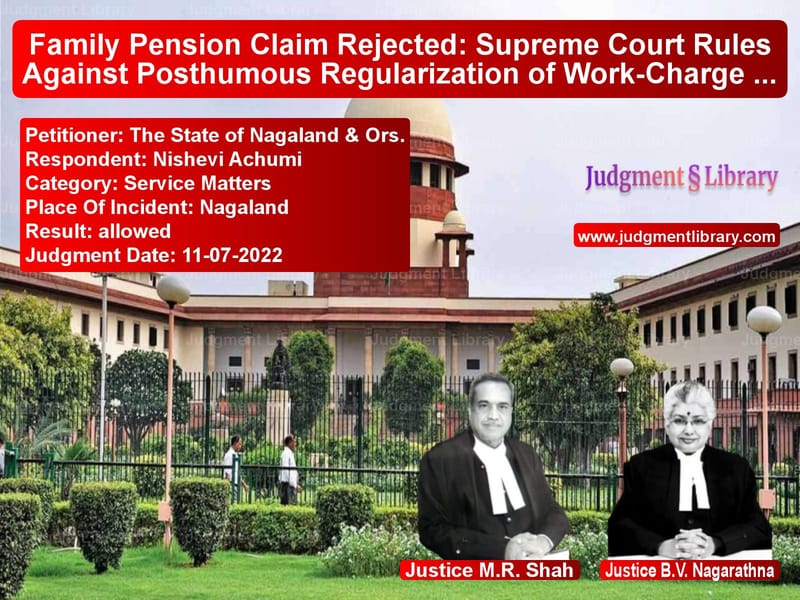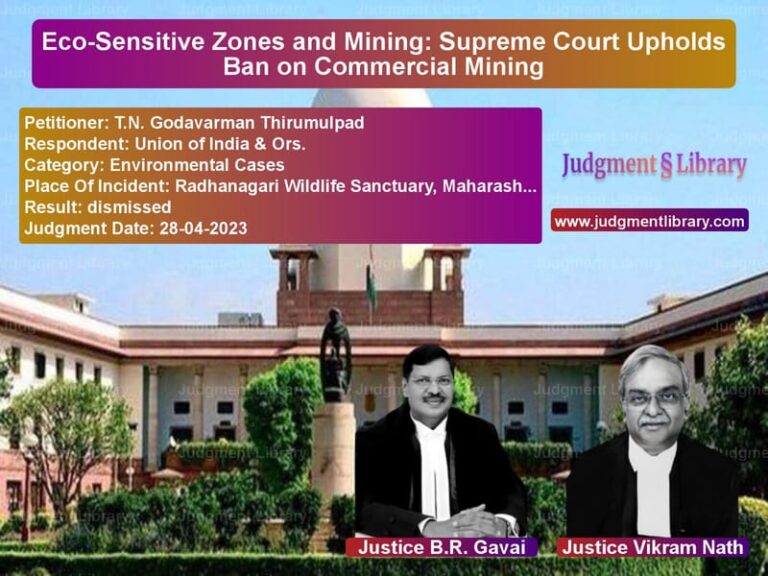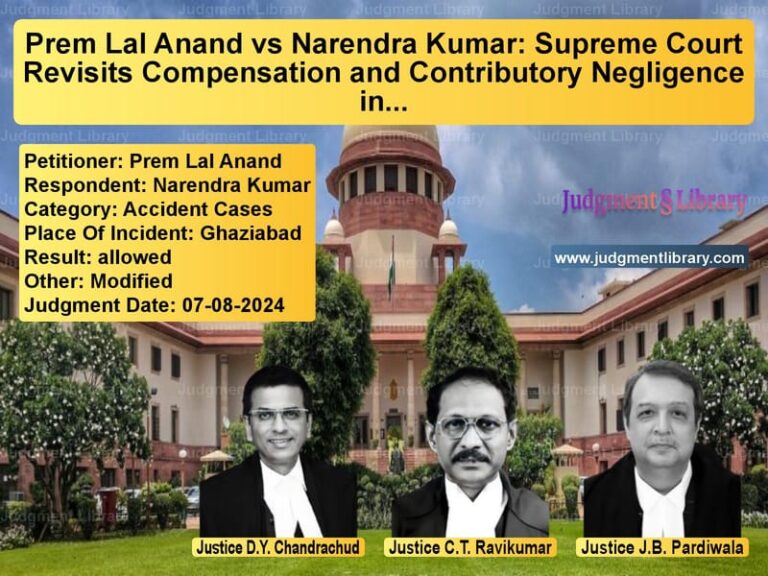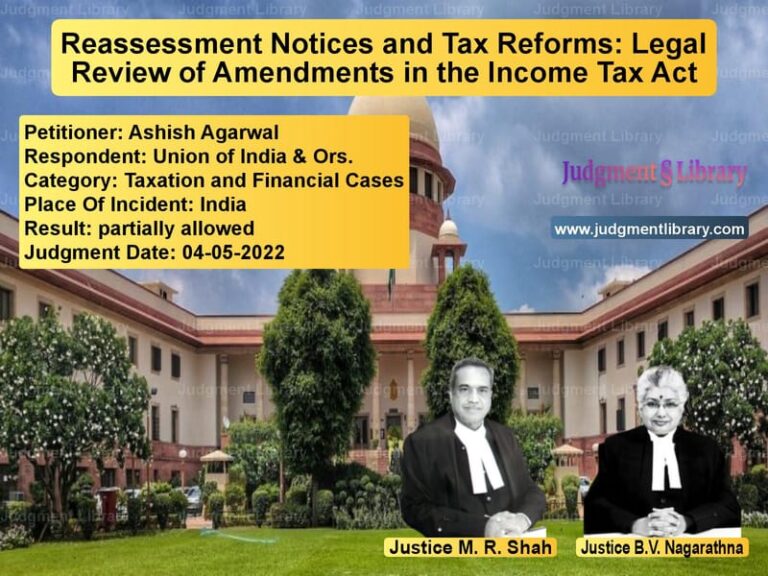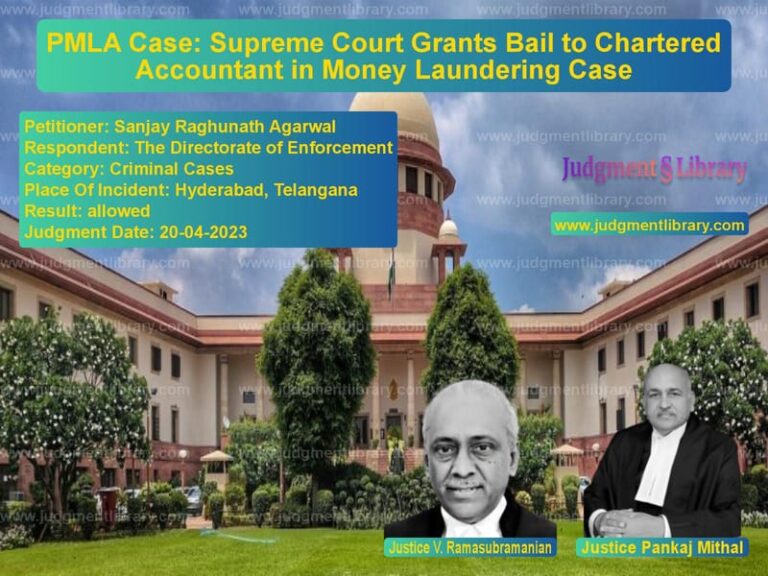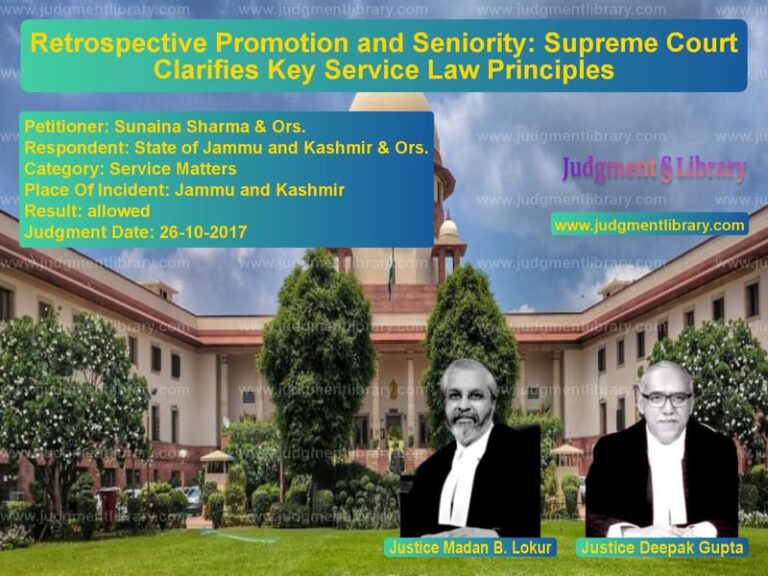Family Pension Claim Rejected: Supreme Court Rules Against Posthumous Regularization of Work-Charge Employee
The case of The State of Nagaland & Ors. vs. Nishevi Achumi revolved around the issue of whether a deceased work-charge employee’s services could be regularized posthumously to grant family pension benefits to his widow. The Supreme Court, in its judgment delivered by M.R. Shah and B.V. Nagarathna, set aside the decision of the Gauhati High Court, ruling that posthumous regularization was legally unsustainable.
The key issue before the Court was whether the widow of a work-charge employee, who had never been regularized during his lifetime, could claim family pension benefits by seeking retrospective regularization.
Background of the Case
The case involved the service status of the deceased husband of the respondent, Nishevi Achumi. The sequence of events was as follows:
- Employment: The respondent’s husband worked as a work-charge Jugali (laborer) in the State of Nagaland.
- Death in Service: He passed away on 28 August 2005, while still a work-charge employee.
- Delay in Claim: The widow filed a writ petition in 2017—12 years after his death—claiming that his services should have been regularized, thereby entitling her to family pension benefits.
- High Court’s Order: The Single Judge of the Gauhati High Court directed the State of Nagaland to regularize the deceased’s service from one day prior to his death and grant family pension to his widow.
- Division Bench’s Decision: The State appealed, but the Division Bench upheld the Single Judge’s ruling.
- Appeal to Supreme Court: The State of Nagaland challenged the decision in the Supreme Court.
Petitioner’s Arguments
The State of Nagaland argued that:
- The deceased employee had never claimed regularization during his lifetime.
- The widow’s claim was made 12 years after his death, making it legally untenable.
- Regularization of work-charge employees was done strictly based on seniority and vacancies.
- At the time of his death, the deceased employee was much lower in the seniority list, and his turn for regularization had not arrived.
- Posthumous regularization was legally unsound and against service regulations.
Respondent’s Arguments
The respondent (widow of the deceased employee) contended that:
- Her husband had served as a work-charge employee for years and should have been regularized before his death.
- The failure of the State to regularize his service deprived her of pension benefits.
- The High Court had rightly directed the regularization of his service retrospectively, ensuring justice for his family.
Supreme Court’s Analysis
The Supreme Court critically analyzed the judgment of the High Court and found significant legal errors in its reasoning.
1. No Right to Posthumous Regularization
The Court ruled that an employee who was not regularized during his lifetime could not be retrospectively regularized for pensionary benefits:
“The High Court has committed a grave error in directing the appellant to regularize the services of the deceased employee one day prior to his death. This is legally unsustainable.”
2. Delay in Filing the Claim
The Court noted that the widow filed her claim 12 years after the employee’s death:
“At the time of his death, the deceased employee never claimed regularization. The respondent’s claim, made more than a decade later, lacks legal merit.”
3. Seniority and Vacancy Rules Ignored
The Court found that the deceased employee was lower in the seniority list and could not have been regularized at the time of his death:
“Regularization of work-charge employees is based on seniority and availability of vacancies. The deceased was far below in the seniority list, and his turn for regularization had not come.”
4. High Court’s Error in Overruling Service Rules
The Supreme Court held that the High Court’s direction to grant regularization was against established service rules:
“The High Court’s order violates service regulations and sets a dangerous precedent where posthumous regularization is sought to claim pension benefits.”
Supreme Court’s Ruling
The Court ruled:
- The High Court’s order was legally unsound and unsustainable.
- The widow’s claim for posthumous regularization was dismissed.
- The order directing the State of Nagaland to grant pension benefits was quashed.
- The original writ petition filed by the respondent was dismissed.
Conclusion
The Supreme Court’s judgment reinforces the principle that employment regularization must follow established rules and seniority lists. The ruling prevents misuse of judicial processes for posthumous claims and ensures that service rules are applied consistently.
This case serves as an important precedent in matters concerning pension claims, emphasizing that courts must uphold legal frameworks governing public employment.
Petitioner Name: The State of Nagaland & Ors..Respondent Name: Nishevi Achumi.Judgment By: Justice M.R. Shah, Justice B.V. Nagarathna.Place Of Incident: Nagaland.Judgment Date: 11-07-2022.
Don’t miss out on the full details! Download the complete judgment in PDF format below and gain valuable insights instantly!
Download Judgment: the-state-of-nagalan-vs-nishevi-achumi-supreme-court-of-india-judgment-dated-11-07-2022.pdf
Directly Download Judgment: Directly download this Judgment
See all petitions in Pension and Gratuity
See all petitions in Public Sector Employees
See all petitions in Employment Disputes
See all petitions in Judgment by Mukeshkumar Rasikbhai Shah
See all petitions in Judgment by B.V. Nagarathna
See all petitions in allowed
See all petitions in supreme court of India judgments July 2022
See all petitions in 2022 judgments
See all posts in Service Matters Category
See all allowed petitions in Service Matters Category
See all Dismissed petitions in Service Matters Category
See all partially allowed petitions in Service Matters Category

